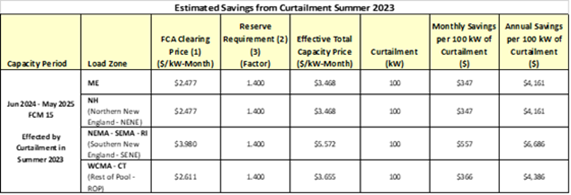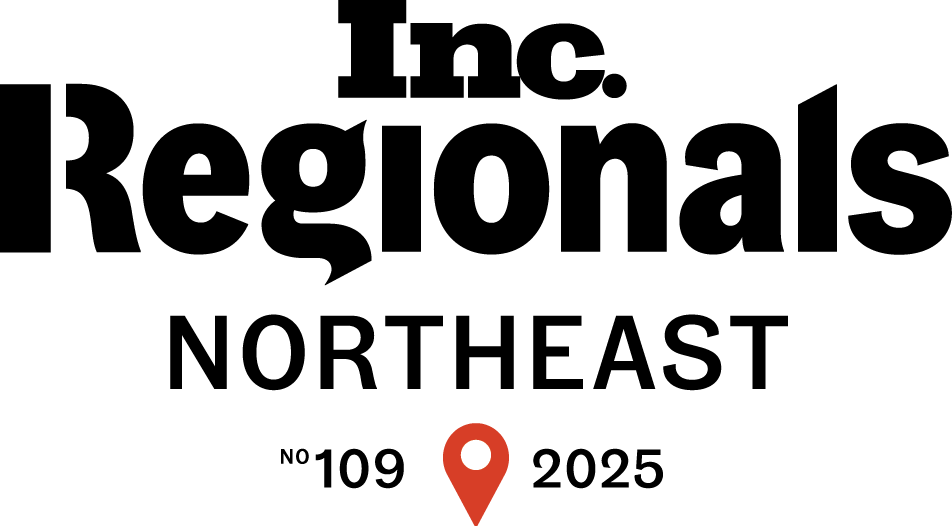Inside this Edition of the Freedom Energy Logistics Muni Minute
Freedom Energy Logistics | June 2023
It’s Summer! The 2023 Peak Demand Season Has Begun
Howard Plante, Vice President Procurement
For more than 10 years, Freedom Energy Logistics has helped municipalities and organizations save thousands of dollars through our Peak Demand – Capacity Tag Management Program. Our notification program is free and offers municipalities a way to reduce demand and the costs associated with capacity charges.
As the summer season gets underway, we want to provide some information to help you decide whether curtailment this summer to reduce your capacity tag makes sense and what the relative cost savings are.
Annual System Peak Overview
The Annual System Peak typically occurs in June, July, or August, and curtailment will define your Capacity Tag effective June 2024 through May 2025. Although each account’s capacity cost is unique, the overall cost of capacity has been steadily going down since Capacity Period 2018-2019 when it hit its highest point (effective from curtailment in the summer of 2017), hitting a low for Capacity Period 2023-2024. The cost for the 2024-2025 period increases slightly from the 2023-2024 period.
After speaking with several end-users regarding curtailment last summer, some elected not to curtail due to the expense of disrupting their operations compared to the savings. Although curtailment during the annual system peak also helps to reduce the need to plan for additional future generation, we recognize the cost may be difficult for some to justify but it can also be a valuable consideration.
How is Capacity Cost Established?
The Capacity Cost (Clearing Price in $/kW-month) is established through the Forward Capacity Auctions held three years in advance of the Capacity Period. However, a second component referred to as the Reserve Margin is not known until after the Annual System peak occurs and is a function of the Annual System Peak and the amount of generation that participated in the Auction. The Reserve Margin essentially increases each account’s capacity tag by a ratio of the MW of generation that was secured in the Auction that must be paid at the Clearing Price, and the Peak MW value.
As an example:
- Annual System Peak = 24,000 MW
- Cleared Generation = 32,000 MW
- Reserve Margin = 32,000 MW/24,000 MW = 1.333
What’s the Estimated Cost Savings from Curtailment this Summer?
For purposes of providing an estimate for the Effective Capacity Cost that will be established this summer for the 2024-2025 Capacity Period, we are using the average of the Reserve Margin for the past several years of 1.4. The Clearing Price is different for each zone. Based on information currently available from ISO-NE (Independent System Operator New England), the estimated Effective Capacity Price including the Reserve Margin is depicted in the table below, as well as the estimated cost savings per 100 kW of reduction in your Capacity Tag that would be realized by curtailing this summer.

Annual System Peak Background Information
The Annual System Peak is the single hour in the calendar year that results in the highest demand for electricity New England wide. The electricity for that demand must be produced instantaneously, and the ISO-NE must ensure that it has adequate generation to meet that peak demand. New England is a summer peaking region due to cooling, air conditioning, and dehumidification; therefore, the Peak will most likely occur in June, July, or August on an extremely hot and humid day.
As the amount of behind-the-meter solar generation has increased over the past several years, it has caused the Annual System Peak to occur later in the afternoon, 4:00 to 5:00 pm in three of the last six years, and 5:00 to 6:00 pm in two of those years. Prior to 2017, the peak predominantly occurred from 2:00 to 3:00 pm. However, the Peak unexpectedly occurred in the 3:00 to 4:00 pm hour last year.
A component of your electricity supply cost is a capacity fee. The capacity fee is assessed based on your electricity usage on the Annual System Peak. Your demand for electricity use at that peak hour will be assessed as your “capacity tag” effective June 1 of the following year and will define your capacity fee for 12 months.
Contact Freedom Energy to Subscribe to Notifications
Freedom Energy takes a proactive approach in assisting its clients with lowering their capacity tag by reducing electricity use during the Annual System Peak hour. Each day we monitor and evaluate factors influencing grid demand, weather forecasts and historical data to predict when that peak hour may occur. Notifications are usually sent to clients two days in advance of a potential peak, typically 3-5 times each summer.
Freedom Energy has saved our clients significant amounts of money over the past 10 years with the Capacity Tag Management program. There is no cost to be on the notification list and it is just another way in which we help to lower your overall energy costs.
Have questions, need more information, or want to participate in Freedom Energy’s Program? Please contact us.
Five Energy Challenges Expressed Most Often by Municipal Clients
Brian White, Municipal Program Director
Freedom Energy’s specialized Municipal Team works with and advocates for cities and towns throughout New England. I am always pleased to hear from you about how we’ve been able to help and for your suggestions about what more we can do to assist. I’m delighted to speak with new Municipal clients, too, because there’s an impending excitement about working with new communities knowing how much Freedom Energy can do to assist in achieving their energy goals.
As City Mayors, Town Administrators, and Executive Directors you assume lots of responsibility in your roles. You are trusted to make decisions impacting tens of thousands and those decisions are often public knowledge, so there is a lot to consider. Pulled in multiple directions at the same time, we fully understand how having a singular focus on any one item, such as energy, is almost impossible without someone on your team to help.
Many of our Municipal clients have expressed a myriad of challenges when it comes to managing their energy spend and usage, and with all the noise surrounding fossil fuels, sustainability initiatives, renewables, and the electrification of new and existing buildings, anyone can feel overwhelmed.
Here is a list of five topics Mayors, Administrators, and Directors have expressed as difficult, and how our specialized Municipal Team assists in helping to alleviate these challenges.
1. Limited Resources.
This is the major concern we hear the most often. Typically, having an “energy manager” is a luxury for most communities and even if your city or town is fortunate enough to have one on staff, it can take a while to fully understand the full breadth of energy management responsibilities. Often energy managers are recent college graduates, new to the complexities of understanding the energy industry and renewable requirements, state-specific incentives, and funding opportunities, where their focus should be, and what will have the biggest impact for their community.
Freedom Energy’s specialized Municipal Team has worked with hundreds of clients and recognizes the demands and requirements. We take the time to understand your community’s unique goals and objectives, we advocate for you, and work closely as a member of your team — you may even consider us an employee. We function as your full-time Energy Advisor at a fraction of a full-time employee’s cost. We live and breathe energy and innovation, and our knowledge is shared with our clients along with recommendations to help you make informed decisions.
2. Sustainability Requirements.
It’s hard enough to stay current with all the needs and expertise to stay current in managing a municipality, let alone being up to speed on sustainability plans and emissions reduction goals. Most sustainability plans have a long-term goal of being carbon free by 2050. Some communities have made great strides toward their net zero plans where others have not started. Regardless of whether your community has a robust plan, one that is in place but far from implementation, or you are at the initial stages of defining and compiling one, having a plan is crucial to success because most, if not everyone, involved in establishing this 2050 goal will no longer work for the city/town in 2050.
Energy initiatives, renewable solutions, and reducing carbon emissions are critical components in Sustainability Plans. Incentives will change, community priorities will be altered, people will come and go. For your plan to be successful, someone must champion and be focused on keeping the city/town on track. Our Municipal Team can assist you in sourcing renewable options to support your sustainability initiatives, taking advantage of the opportunities, for example, Renewable Energy Certificates (RECs), net metering, community solar, and battery storage, all part of solutions designed to help achieve your goals.
3. Financial Constraints.
There’s never enough money to go around or financial support for all the initiatives. The Federal Government and each state offer a variety of grants and financial incentives for communities to set and achieve their sustainability goals. Some recent support for municipalities includes Green Communities grants, funding under the Inflation Reduction Act (IRA), Environmental Protection Agency (EPA) funding, Fleet Electrification funding, State Funding, and a wide variety of utility programs. Sounds great, right? There is one problem – how and where do you get them?
Freedom’s Municipal Team can assist by keeping you apprised of what is available now, what might be available down the road, and what is no longer available. We have carefully and selectively established partnerships with companies specializing in areas such as battery storage, Municipal-specific community solar programs, net metering opportunities, and greenhouse gas reporting. When paired with the incentives mentioned above, these projects can often be implemented at little to zero out of pocket cost.
4. Confusing Contract Terms & Conditions.
Not understanding ALL the terms and conditions of your signed contract can be a very valid concern. Several of our clients responsible for energy management have said they have written off certain companies or suppliers in the past due to poor experiences with them. In some cases, the supplier followed the path in the signed contract. As consumers, we all are conditioned to take the “best” offer available but what you see is not always what you get. This is not only frustrating but often can be very costly. With so much competition in the energy space, many companies do whatever they can just to win business. As a result, the lowest price on paper might not be the best option for your city/town. This can create friction in the municipal space because cost is everything.
Freedom Energy’s Chief Executive Officer is an energy attorney who continually advocates for our clients. His expertise has been instrumental and played to our clients’ advantage in terms of stronger, highly client-focused contracts from energy suppliers, and in resisting attempts by several suppliers over the years to pass through invalid contract increases. Freedom Energy’s Customized Supplier Agreements were designed specifically for clients like you, with benefits from the additional protections and language in the specialized agreements that you will not find in typical supplier agreements. Not only does our Municipal Team offer these customized, pre-negotiated agreements, where every section has been closely vetted for you, we continue to advocate on your behalf. Our clients can feel confident that any agreement placed before them was selected and is recommended for a variety of beneficial reasons—often extending far beyond just “the lowest price.”
5. Community Support.
Pleasing everyone is just impossible. We all have opinions and in the municipal space, everyone is encouraged to share their opinion. If a decision is made that costs the community money, despite the circumstances in which that decision was made, people will be angry. If a decision is made that worked 95% of the time, people will want improvement.
Freedom Energy supports our clients and assists you in delivering the right message both internally and out in the community. We can help you to communicate with, work with, and educate the communities you serve. Our team has produced client videos, press releases, webinars, attended city/town meetings, and worked with that one Select Board member who has impossible standards. Your success is our success, and we will not stop until everyone involved feels the desired outcome has been achieved and is sustainable going forward.
Do these five challenges resonate with you?
Check out our next Muni Minute for five more items Mayors, Administrators, and Directors find difficult, and how Freedom Energy helps them navigate the ever-changing energy landscape. To be continued …
In the meantime, please let me know if you agree and if there is anything we can do to support your community. You can reach me at bwhite@felpower.com.
US EPA 2023 CSB Grants Program: Opportunity for Municipalities
Is your community considering replacing its existing school buses with clean, zero-emissions (ZE) buses?
The US Environmental Protection Agency’s 2023 Clean School Bus (CSB) Grants Program1 may be of interest.
The EPA Office of Transportation and Air Quality is soliciting applications from eligible entities to incentivize and accelerate the replacement of existing school buses. Eligibility includes the replacement of existing internal-combustion engine school buses with electric, propane, or compressed natural gas school buses, as well as the purchase of electric vehicle supply equipment (EVSE) infrastructure and EVSE installations.
The EPA anticipates awarding approximately $400 million in competitive grant funding under the Clean School Bus (CSB) Grants Program Notice of Funding Opportunity (NOFO). The program is soliciting applications nationwide for a grant competition to fund the replacement of existing school buses with clean and zero-emission (ZE) school buses.
Applications will be accepted from state and local governmental entities that provide bus service, including public school districts, eligible contractors, and nonprofit school transportation associations.
All application packages must be submitted electronically to the EPA through Grants.gov no later than Tuesday, August 22, 2023, at 11:59 p.m. (ET) to be considered for funding.
For more information about the grant program, visit the EPA website.
1 https://www.epa.gov/cleanschoolbus/clean-school-bus-program-grants










Connect With Us